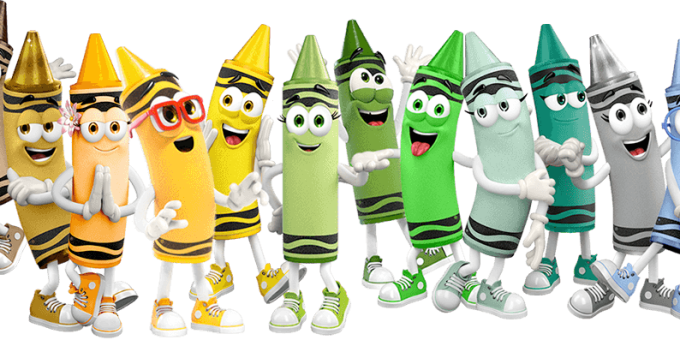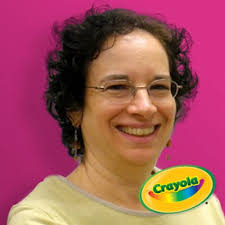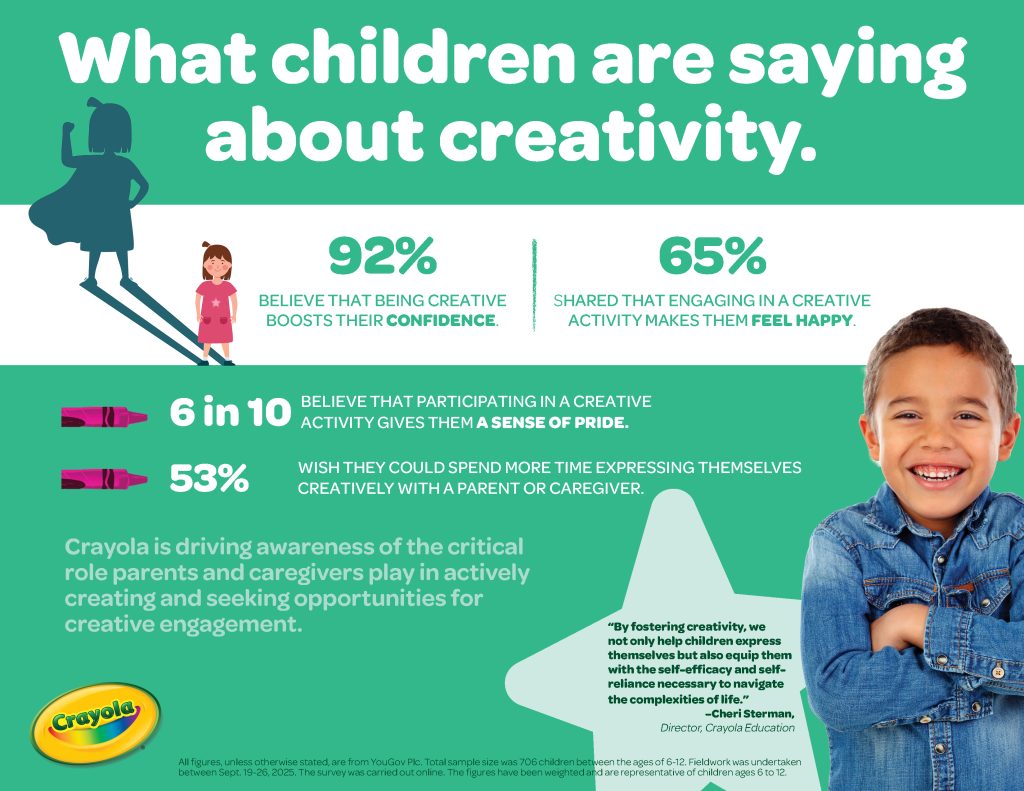
INDIANA—New research commissioned by Crayola, the renowned children’s creativity brand, highlights how creativity and confidence are deeply connected, revealing its role as a powerful catalyst for educational, emotional, and cognitive growth.
The study found that among 6 to 12-year-olds surveyed, 92% believe being creative boosts their confidence. The results further highlight Crayola’s evidence that creativity helps children express themselves and builds the self-efficacy and resilience needed to navigate life’s complexities.

“Creative activities help children recognize their unique talents and develop a deeper belief in their abilities – giving children an incredible sense of joy and accomplishment,” said Cheri Sterman, senior director of education at Crayola. “By prioritizing creativity, we not only enhance children’s immediate happiness but also equip them with the confidence and skills they need for future challenges.”

Notably, the study reveals that when faced with challenges, children rely on their creative ideas rather than depending on others or giving up. This instinct to turn inward for solutions demonstrates a natural tendency towards creative problem-solving.
Fostering these qualities is a core aspiration for parents, as they want their children to grow into capable, confident individuals. As Sterman explains, creativity unlocks children’s full potential by enabling them to embrace their unique talents, express themselves fully, and ultimately grow into the best version of themselves.
Further findings from the study include:
- 65% of children shared that engaging in a creative activity makes them happy and excited to participate.
- Nearly six in 10 (59%) shared that participating in a creative activity gives them a sense of pride.
- More than half of participants (52%) shared that creativity makes them feel like they’ve accomplished something.
- 53% wish they could spend more time expressing themselves creatively with a parent or caretaker, while 52% of young children (ages 6-7) and 51% of pre-teens (ages 8-12) noted that they participate in a creative activity most days.
“When children feel free to create without fear of judgment, they develop a sense of pride in their work, strengthening their views of self, thereby bolstering self-esteem,” added Sterman. Moreover, shared artistic experiences deepen family bonds and nurture a supportive environment, fostering children’s imaginative abilities and helping to lay a foundation for self-assuredness as they grow.
The YouGov-conducted study also highlights the emotional benefits of creativity, including increased happiness, excitement, and pride. Engaging in creative activities empowers children to express their thoughts, feelings, and unique identities, fostering a sense of ownership over their ideas and creations.
The survey supports Crayola’s Campaign for Creativity, an advocacy initiative championing the importance of childhood creativity as a critical life skill that empowers kids to reach their full potential. Central to this effort is Crayola’s focus on driving awareness of the essential role parents and caregivers play in actively creating and seeking opportunities for creative engagement.
Crayola is helping remove barriers to creativity for parents by providing free creativity resources at Crayola.com, and through programs such as Crayola Creativity Week, a free, weeklong global celebration designed to inspire and encourage creativity in children through art, storytelling and hands-on activities. Parents and educators can sign up today for the event taking place Jan. 27– Feb. 2, 2025.
About Crayola
Crayola LLC, based in Easton, Pa., and a subsidiary of Hallmark Cards, Incorporated, is the worldwide leader in children’s creative expression products. Known for the iconic Crayola Crayon first introduced in 1903, the Crayola brand has grown into a portfolio of innovative art tools, crafting activities, and creative toys that offer children innovative new ways to use color to create everything imaginable. Crayola Learning provides free creative learning resources to K-educators to prepare students with academic and life skills that hinge on creativity. Visit www.crayola.com/education for more information, or join the community at www.facebook.com/crayolaeducation. All figures, unless otherwise stated, are from YouGov Plc. /total sample size was 707 children aged 6-12. Fieldwork was undertaken between Sept. 19-26, 2024. The survey was carried out online. The figures have been weighted and represent children ages 6 to 12.



